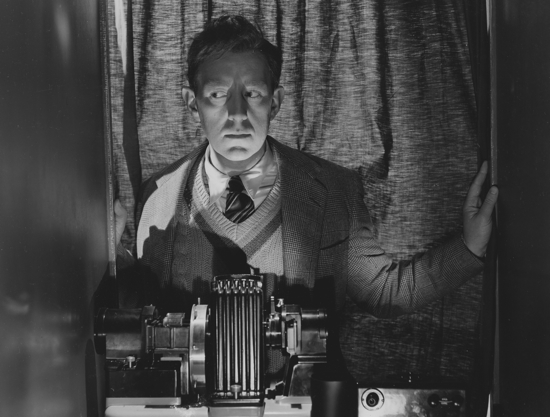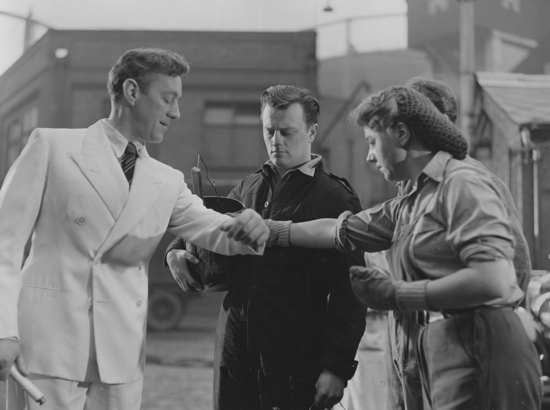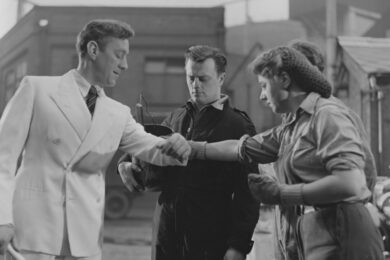"Why can’t you scientists leave things alone?" asks the disaffected cleaning lady Mrs Watson (Edie Martin) of the eager boffin Sidney Stratton (Alec Guinness), in Alexander Mackendrick’s majestic 1951 comedy The Man in the White Suit. Note the term ‘majestic’ here, rather than ‘classic’, because while Mackendrick’s movie is a masterly satire it stands apart from the warmly comic and reassuring world often signified by Ealing Studios.
The Man in the White Suit has been digitally restored for a special edition DVD and first-time Blu-ray release this week. Bonus material on StudioCanal’s excellent disc includes commentaries from film historians Ian Christie and Richard Dacre, plus thoughts from director Stephen Frears, whose own work features strains of dark humour. "It’s very English," says Frears of Mackendrick’s irony, "and it’s rooted in English struggles."
Yet the English setting spreads beyond ‘Englishness’ into universal themes, while the supposedly cosy tone of the typical Ealing comedy is disturbed. Several critics have lately noted that Mackendrick’s picture nuances the idiom of muddling through hard times with a spirit of hearty cheer. Some say The Man in the White Suit fits a more mordantly-toned category of film that is less Ealing comedy and more comedy made at Ealing. Robert Hamer’s Kind Hearts and Coronets (1949) and Mackendrick’s later sardonic crime caper The Ladykillers (1955) also subvert the gentler Passport to Pimlico (1949) or The Titfield Thunderbolt (1953), pictures thought to epitomise Ealing’s often upbeat and optimistic postwar humour.
Ealing Revisited, a new anthology published by the BFI, boasts fine reappraisals from a variety of writers. Tim O’Sullivan assesses what he terms the "Ealing feeling" in the studio’s comedies, separating them into two groups, the "daydreams" and the "nightmares". The former, which include …Pimlico and …Thunderbolt, see "good eggs" triumph over "dirty rotters", whereas the latter see more ambivalent heroes struggle with charlatans, scoundrels and malcontents. Stories become the survival of the fittest, rather than the best, even if the best can be determined. The morality of the narrative, its characters and its viewers become, at best, ambiguous.
The Man in the White Suit is one of O’Sullivan’s nightmare comedies, perhaps the ultimate nightmare, as it deals in a fantastic world of science gone wrong. Guinness’ Sidney Stratton is a brilliant but eccentric chemist – "at Cambridge they gave me a first and a fellowship" – who, through a series of wild surmises and intuitive deductions, invents an indomitable fabric that doesn’t tear, stretch or fade and which resists all kinds of dirt. Sidney’s motives stem purely from the scientific drive for discovery, but having created what is effectively the textile equivalent of perpetual motion, his invention becomes the subject of much curiosity and controversy. From the highest to the humblest, all those involved begin to fret. "Some fool has invented an indestructible cloth," inveighs one manufacturing mogul. "What about my bit of washing?" worries Mrs Watson.
If the mixed domains of chemistry, textiles, business and labour relations sound unlikely grounds for comedy, then it must be stated that the farcical reactions prompted by Sidney’s discovery are both hilarious and hubristic. What are the implications of this ultimately imperishable material? The textile bosses worry about business, while the workers worry about job security. "But if this stuff never wears out," they reason, "we’ll only have one lot to make." It seems the invention of perfection leads to overprotection.

As Sidney is assailed by both sides of the great class divide, making him the piggy in the middle, Mackendrick treats us to some sublime slapstick farce. It’s delightful to see our hero escaping down the side of a building, supported only by the twine of his own fabric and his luminous suit glowing in the dark. The finale’s chase sequence, when Sidney is surrounded by all sides, evokes the earliest silent comedies and depicts society thrown into furious chaos. It’s truly cinematic.
"It’s impossible to watch the film and not enter into discussion," Ian Christie states. "It’s an accurate portrayal of what happens when the balance of nature is upset." In its scorn for both sides of labour/manager relations, The Man in the White Suit might appear as a precursor to the Boulting Brothers’ I’m All Right Jack (1959). There are clear similarities but whereas the second is a farcical parable, the first is a satirical, fantastical allegory. Pushed beyond class politics Sidney’s invention symbolises a kind of Frankenstein tale, where humanity’s inventiveness overwhelms its capabilities of control. Both factions seek to maintain possession over the everlasting yarn and keep it from the grasp of the opposing side. During the early Cold War period, when antagonistic ideologies were stockpiling nuclear arsenals against each other, this metaphor must have rung true.
If Mackendrick’s movie anticipates the Boulting Brothers, it also looks forward to Stanley’s Kubrick’s Dr Strangelove (1964). This suggests something darker than the comforting comedy associated with Ealing, full of whimsical wonder and loveable eccentricity. Guinness’s Sidney is eccentric alright, but he is not unqualifiedly lovable. Dramatically, at times Guinness’s clear sexlessness becomes narratively unconvincing, particularly when he plays opposite Joan Greenwood’s smoky-voiced sexiness. It must be acknowledged that the climax is somewhat conveniently contrived, but a story that achieves such levels of entertainment and provocative insight deserves some dramatic licence. Far from being a typically cosy Ealing comedy, The Man in the White Suit takes what’s unsettling and makes it satirically comic.
The Man in The White Suit is out now on DVD and Blu-ray via StudioCanal. The film screens at BFI Southbank on November 29.



